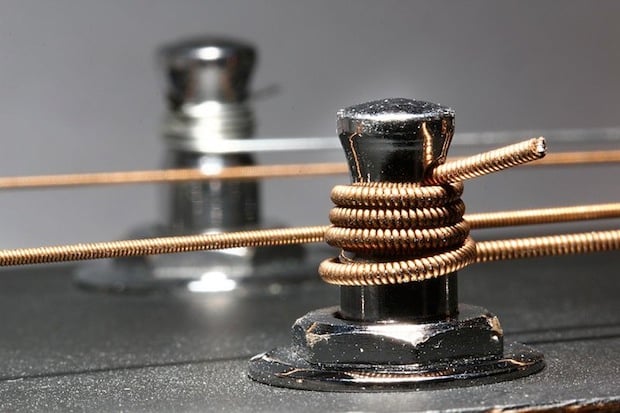 Image via Wikipedia
Image via Wikipedia
If you're a guitarist or bassist, a brand new set of strings can turn your whole day around. Brand new strings offer a tone with maximum brightness and attack. Depending on a variety of factors, this "new-string sound" can last for about a week or two before it starts to taper off, and the strings slowly wear down until they "die." While it's recommended to change guitar strings every few weeks, it's ultimately up to you to decide how often you want to change your strings. Old strings will have more or less of an impact on your sound based on the type of instrument you're playing, the style of music being played, and the amplification (if there's any amplification at all).
To figure out how to make strings sound newer for longer, we need to know: What exactly happens to strings that makes them sound old? These factors can be boiled down to corrosion, stretching, and dirt accumulating on the strings, and addressing each factor is a completely different endeavor. While stretching of the string is unavoidable short of detuning your guitar between uses, corrosion and dirt can be largely avoided by following these simple tips.
Minimizing corrosion
1. Keep your instrument in its case
This is your first line of defense against harmful string corrosion. Air that is too humid or not humid enough can be hard on your strings and cause oxidation on a molecular level. By keeping your instrument in its case, you're taking the first step towards regulating its environment. On top of that, keeping your instrument in its case keeps it away from dust and particles in the air that can adhere to your strings, or even get into the hardware of your instrument.
[4 Smart Tips to Save Your Dying Music Gear]
2. Wipe your strings down
When you play your instrument, especially for long periods of time, your hands will produce sweat and oil that can be corrosive to your strings. While this issue is generally unavoidable, the easy solution is to wipe down your instrument's strings after each use. Just take a small rag made of felt or cloth and rub down the strings from top to bottom. Take the strings one by one and make contact with all sides of the string, especially the underside where residue may be accumulating. Wiping down your instrument after each use will dramatically increase the life span of your strings, and in doing so, reduce your spending on keeping that freshly strung tone.
3. Consider buying coated strings
Some strings are more susceptible to corrosion than others. Next time you're at your local music shop, or wherever you buy your strings, take a look at some of the higher end options. If you're a heavy player, you may want to consider coated strings. These strings have a delicate layer of coating that greatly reduces corrosion on the strings. So give a coated set of strings a try, see how much longer they last, see if you like the sound, and decide what works best for your needs.
Minimizing dirt
4. Wash your hands
The easiest way to keep your instrument clean is to keep it from getting dirty in the first place. If you don't wash your hands before you pick up your instrument, you'll undoubtedly be getting all the dirt and grime from your day onto your strings. This small hygiene habit can drastically increase the life span of your strings.
5. Look into cleaners
There are a variety of string cleaning products on the market that all claim to be the best at extending the life of your strings. These products are applied directly to the strings with a piece of cloth, and many even claim to make the fretboard smoother and easier to play by using lubricant or a gentle oil. These cleaners are found in most any guitar tech's shop, but you can find them online or at your local guitar shop.
6. Boil your strings
This one's for the bass players out there who have to drop at least 20 bucks every time they buy a fresh pack of strings. The surefire way to make old dirty strings sound almost brand new again is to boil them. Just take your strings off your bass or guitar, drop them into a boiling pot of water, and let them boil for about 15 minutes. After they're done just drain the water, make sure to scrub that pot like you mean it (as it's going to be filled with all the dirt from your hands over the past month), and put the strings back on your instrument. Voilà! Your strings sound as good as new.
Use all of these tricks, and you'll maximize the life of your strings and get your money's worth out of every pack you buy!
Max Monahan is a bassist and a writer living in Los Angeles. He spends his time working for an audio licensing website and shredding sweet bass riffs.


